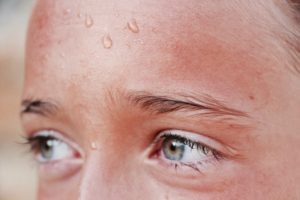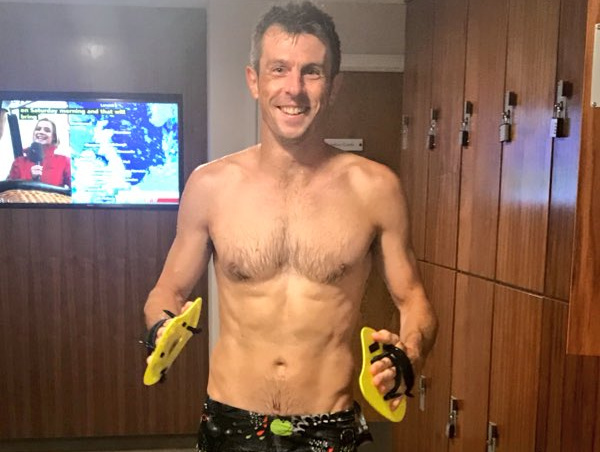We all know know that running hard makes us sweat, especially in hot and humid weather. But how much do you really understand about its impact on your performance?

Our bodies naturally sweat to keep us cool during physical exertion or in hot conditions. It’s actually a really neat process! Sweat is mostly made up of water, and when that evaporates, it cools our bodies down.
Along with water, sweat contains small amounts of electrolytes, which are essential to the body’s function and need to be replaced. That’s why sport drinks contain electrolytes, with sodium being a key ingredient. The exact balance of how much sodium we lose and should replace is very individualized.
Understanding this can help us prepare for long or hot training runs and races, as well as aid with recovery.
I’m excited to dive in to this topic with our expert, Andy Blow.
Andy Blow: CEO of Precision Hydration

Andy Blow is a Sports Scientist with a degree from the University of Bath, focusing his expertise on sweat, dehydration and cramping. As an elite level triathlete, these topics have been a particular interest to him for a long time.
He’s not just a heavy sweater but he sweats out a lot of sodium, which is a tough combination. In his younger days, Andy finished in the top-10 of Ironman and IM 70.3 races, as well as winning an Xterra World title.
Andy previously worked as the Team Sports Scientist for the Benetton and Renault Formula 1 teams, and remains an adviser to the Porsche Human Performance Centre. He is also the founder and CEO of Precision Hydration, a company focused on – you guessed it – hydration for athletes.
So we know he has a thing or two to share about athletic performance and how hydration ties in!
The Sweaty Details
Today’s conversation is a long overdue episode on hydration. I’m thrilled to have Andy Blow on to share his expertise.
As runners, we’re all familiar with cramping, electrolytes, and hydration – but Andy really breaks these down for us. We talk about:
- Fluid loss, dehydration, and over-hydration (known as hyponatremia)
- Electrolytes
- Environmental factors
- Determining your sweat rate
- What to do if you are a salty sweater
Andy helps us understand how to apply all this in training and in races. And I really appreciate his emphasis on simplifying hydration, depending on the environmental conditions and duration of workouts.
I hope this topic will be as fun for you to learn about as it was for me.
You can hear more of our podcasts by subscribing in iTunes, Spotify, Stitcher, iHeartRadio, or Google Play.
Show Links & Resources:
- Precision Hydration, use code “strengthrunning” at checkout for 15% off
- Blog post with spreadsheet to track sweat rate
- How to train through summer
Thank You Naked Nutrition

I want to thank Naked Nutrition for their sponsorship of this podcast. They make great dietary supplements without artificial sweeteners, flavors, or colors. Only the purest ingredients – and everything is made in the USA.
I’ve been taking their Vanilla Whey Protein Powder for a few months now and can confidently say that it’s the best protein powder I’ve ever had: it tastes great and I know I’m not ingesting what I don’t need. I’ve used a lot of different protein powders over the years and this is definitely my favorite.
I love that this protein powder has only 3 ingredients and the whey is sourced from grass fed cows’ milk. For those looking for a plant-based option, Naked Nutrition has vegan protein powders as well, also made from clean ingredients.
I’ve also started taking their Naked Greens supplement, which is basically a powder of different vegetables, grasses, and leafy greens. It certainly tastes like grass (that’s the point, I think) but I like the fact that I’m giving my body an extra dose of veggies. I know many of us can all use a boost in our nutrition and this is a great way to do it.
Check out all their products and let me know what you think!